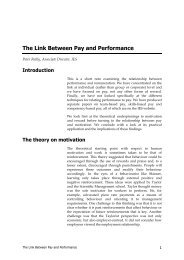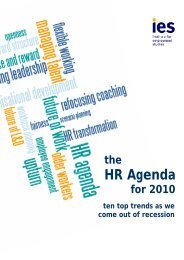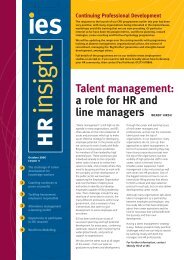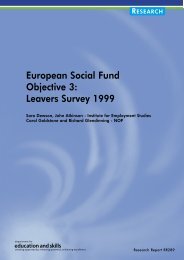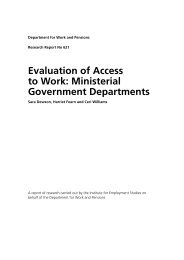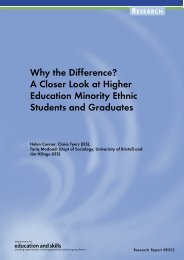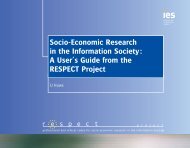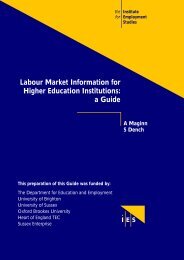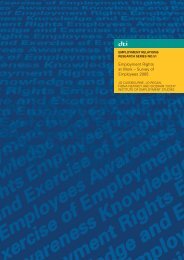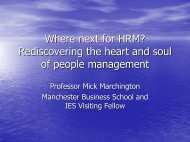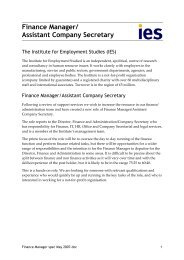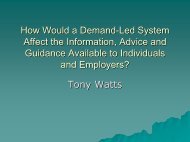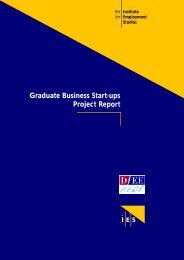Post-16 Transitions: a Longitudinal Study of Young People with ...
Post-16 Transitions: a Longitudinal Study of Young People with ...
Post-16 Transitions: a Longitudinal Study of Young People with ...
You also want an ePaper? Increase the reach of your titles
YUMPU automatically turns print PDFs into web optimized ePapers that Google loves.
9.2 <strong>Young</strong> people’s views on the future<br />
<strong>Young</strong> people were asked if they agreed or disagreed <strong>with</strong> a<br />
number <strong>of</strong> statements about the future and the results are<br />
presented in Tables 9.1 to 9.8 below.<br />
It is clear that there is a fair degree <strong>of</strong> optimism about many<br />
aspects <strong>of</strong> the future (Table 9.1). Most young people taking<br />
part in the survey believe that the courses, jobs and training<br />
etc. that they have done since Year 11 have worked out well<br />
for them (71 per cent). Most young people also report that they<br />
know how to find out about future work, education or<br />
training opportunities (78 per cent). Nearly all young people<br />
are hopeful about the future (85 per cent) and very few think<br />
that planning for the future is a waste <strong>of</strong> time (only 12 per cent<br />
agreed <strong>with</strong> this statement). Seventy-three per cent <strong>of</strong> young<br />
people want to go on to do more education or training in the<br />
future although only 25 per cent believe they have all the<br />
qualifications they need for the job or course they want to do.<br />
Moreover, 20 per cent <strong>of</strong> all young people surveyed reported<br />
that they do not get enough support to plan for the future.<br />
Taking each statement separately, a few differences become<br />
apparent according to statement, school or SEN type:<br />
• <strong>Young</strong> people <strong>with</strong> behavioural, emotional or social<br />
development needs were less likely to think that what they<br />
had done since Year 11, in terms <strong>of</strong> course, jobs or training<br />
etc. had worked out well for them than young people <strong>with</strong><br />
all other types <strong>of</strong> SEN.<br />
• <strong>Young</strong> people who had been statemented at school and/or<br />
who had attended a special school were less likely to know<br />
how to find out about future work, education or training<br />
opportunities than those <strong>with</strong>out statements, or those who<br />
had attended a mainstream school.<br />
• <strong>Young</strong> people who had attended a special school were less<br />
likely to feel hopeful about the future compared to young<br />
people from mainstream schools. <strong>Young</strong> people <strong>with</strong><br />
sensory and/or physical disabilities were also less likely to<br />
feel positively about the future compared <strong>with</strong> those <strong>with</strong><br />
all other types <strong>of</strong> SEN.<br />
• <strong>Young</strong> people <strong>with</strong> sensory and/or physical disabilities<br />
were more likely to want to do more education and<br />
training in the future than young people <strong>with</strong> all other<br />
types <strong>of</strong> SEN. They were also more likely to report that<br />
they did not have all the qualifications they needed to do<br />
the job or course they wanted to do.<br />
128<br />
<strong>Post</strong>-<strong>16</strong> <strong>Transitions</strong> <strong>of</strong> <strong>Young</strong> <strong>People</strong> <strong>with</strong> SEN: Wave 2



